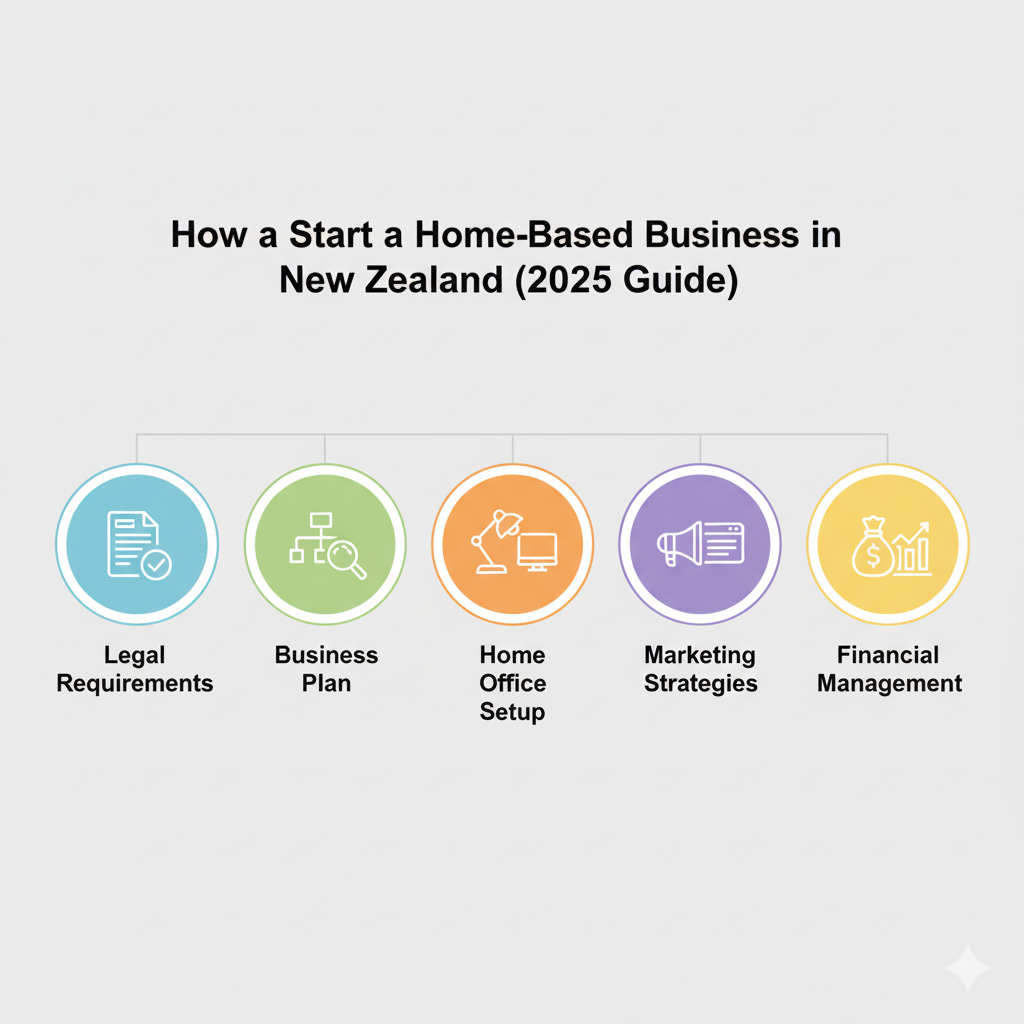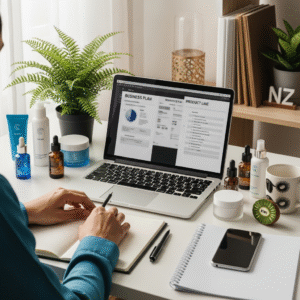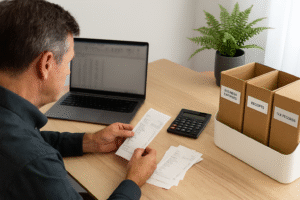How to Start a Home-Based Business in New Zealand
In New Zealand, it’s easier than ever to start a business from the comfort of your own home. Kiwis are turning their hobbies into profitable businesses more and more because the business environment is friendly and the culture values new ideas. Starting a small business from home gives you more freedom, lower costs, and the chance to make something that is truly yours.
This guide will tell you everything you need to know to start a small business from home in New Zealand. We’ll talk about the most important legal steps, how to make a good business plan, and some useful advice on how to handle your money and time. By the end, you’ll have a clear plan for turning your idea for a home-based business into a successful one.
Getting to Know the Legal Requirements
You need to do the right legal work before you can start selling. Getting this right from the start will save you trouble later on.
Pick the structure of your business.
The way your business is set up affects your taxes, your liability, and the forms you need to fill out. There are three common choices for a small home business in New Zealand:
- Sole Trader: This is the easiest and most common way for people to start a business. You are the business, which means you are personally responsible for all of its debts and duties. All profits are treated as your personal income. Setting it up is simple and doesn’t require much paperwork.
- Partnership: A partnership might be the best option for you if you and at least one other person are starting a business together. Partners are personally responsible for business debts, just like sole traders. However, this responsibility is shared. It is very important to have a written partnership agreement that spells out each person’s duties, contributions, and how profits will be shared.
- LLC, or Limited Liability Company: A company is a separate legal entity that is formed. This means that your personal property is safe from business debts. It costs more and takes more work to set up and keep up, but it offers more protection and may make it easier to get money or sell the business in the future.
For most people who want to start a small business from home, the easiest way to do it is to start as a sole trader. You can always change the way your business is set up as it grows.
Sign Up Your Business
After you pick a structure, you have to register your business.
- Sole traders and partnerships don’t have to register a business name unless it’s not the same as their own name. But you will need a New Zealand Business Number (NZBN), which is a special number that makes it easier to deal with government agencies. If you think your annual turnover will be more than $60,000, you’ll also need to register for GST with Inland Revenue (IRD).
- The New Zealand Companies Office must have records of all businesses. You will pick a company name, appoint directors and shareholders, and get a Certificate of Incorporation during this process.
Zoning, permits, and licenses
Depending on what you do for a living, you may need special permits to run a business from home.
- Permit for a Home Business: Ask your local council if there are any rules about running a business from your home. People often call this “zoning for home business.” Rules can vary, but they often relate to noise, traffic, signage, and the use of hazardous materials.
- Industry-Specific Licenses: Some kinds of businesses, like those that prepare food, care for children, or give financial advice, need special licenses to run legally. Make sure you follow the rules for your industry by doing your research.
- If you’re not from New Zealand, there are extra steps you need to take to start a business there. You will need the right visa to work or run a business in the country. Immigration New Zealand has a lot of information about visas for entrepreneurs.

Making a good business plan
Your business plan is your strategic roadmap. It makes your vision clearer and gives you a clear path to follow, which makes it easier to make choices and see how well you’re doing.
Researching the Market
Check to see if your idea is valid before you spend time and money on it.
- Find out who your target audience is: Who are the best customers for you? What do they need, what problems do they have, and how do they buy things?
- Look at your competitors: Who else is selling something like this? What are the things they do well and the things they do poorly? How can you differentiate yourself?
- Check the demand in the market: Is there a real need for what you’re selling? Find out how interested people are by using online tools, surveys, and social media.
Explain what your product or service is
Clearly say what you’re selling. What issue does it help your customers with? What sets it apart? It is important to focus on the benefits rather than just the features. Instead of saying you sell “handmade candles,” say you “make any home feel cosy and relaxing.”
Financial Projections
It’s very important to have a realistic financial forecast.
- Costs of Starting Up: Make a list of all the costs you’ll have to pay to start your home business, such as buying equipment, building a website, getting your first inventory, and paying for registration.
- Pricing Plan: Find out what your price will be. Your prices should cover your costs, make you money, and show how much value you add.
- Expected Income: Make a guess about how much you’ll sell in the first one to three years. Be honest and use your market research to make your predictions.
- Forecast of Cash Flow: Plan how money will come into and go out of your business. This will help you plan for any shortfalls and keep your money in good shape.
How to Set Up Your Home Office
Creating a productive workspace is key to maintaining focus and professionalism when you start a small business from home.
Make a Workspace Just for You
Set aside a certain part of your home just for your business. This could be a spare room, a corner of your living room, or even a garage that you turned into a room. Having a separate space helps you switch between “work mode” and “home mode,” which makes your work-life balance healthier.
Get the Right Tools
The kind of equipment you need will depend on your business. Here are some things that are usually needed:
- A computer that works well and a fast internet connection.
- A desk and chair that are comfortable and good for your back.
- A dedicated phone line or a second SIM card for business calls.
- Any special tools or software you need for your job.
- Storage solutions to keep your workspace organized.
Keep your receipts because a lot of the costs of running a home business are tax-deductible.
How to Market Your Home Business
You could have the best product in the world, but if no one knows about it, you won’t be able to sell it. Marketing is about reaching your target audience and convincing them to buy from you.
Build an Online Presence
If you want to run a business from home in New Zealand, you need to be online.
- Your website is like a digital shopfront. It should be easy to use, look professional, and make it clear what you have to offer. It’s easy to start a small business from home in New Zealand online with platforms like Shopify, Squarespace, or WordPress.
- Pick the social media sites where your target audience spends their time. Build a community, share useful information, and talk to potential customers on social media.
- Search Engine Optimization (SEO): Use keywords that are relevant to your website and content, such as “small business ideas NZ” or “how to start a small business at home in NZ,” so that people can find you on search engines like Google.
Get to Your Target Audience
Think about other ways to market your business besides being online:
- Email marketing means making a list of people who want to get your emails and sending them regular newsletters with news, deals, and useful information.
- Content Marketing: Write blog posts, make videos, or record podcasts that talk about your audience’s problems and show that you know what you’re talking about.
- Local Markets and Events: If you sell things in person, going to local markets is a great way to meet customers and get their direct feedback.
Managing Your Finances
A business that can last must have good financial management.
Taking Care of Your Money
A business that can last must have good financial management.
Keep track of your income and expenses.
From the very first day, keep careful track of all the money that comes in and goes out. Use accounting software like MYOB or Xero, or even a basic spreadsheet. This will help you figure out how well your business is doing financially and make tax time a lot easier.
Set Up a Different Bank Account
Even if you work for yourself, you should still open a separate bank account for your business. This keeps your personal and business finances separate, which makes it easier to keep track of your spending and cash flow.
Know what taxes you have to pay
You have to pay your own taxes in New Zealand.
- Tax on Income: If you’re a sole trader, you’ll have to pay income tax on the money your business makes on your personal tax return.
- If your business makes more than $60,000 in a year, you have to register for and charge Goods and Services Tax (GST).
- ACC Taxes: You will need to pay ACC levies to cover the cost of any work-related injuries.
Consider setting aside a portion of your income regularly to cover your tax obligations.
Finding a balance between work and life
One of the biggest challenges of running a business from home is the blurring of lines between your professional and personal life.
- Make Your Limits Clear: Set regular work hours and stick to them. When your workday is over, shut down your computer and focus on your personal life.
- Take breaks often: Get up from your desk every so often to stretch, eat, or get some fresh air.
- Talk to Your Family: Tell your family or roommates when you need time to yourself and when you will be at work.
Planning for Growth
It’s smart to think about the future, even if you’re just starting out.
- Set up systems that can grow: Use tools and processes that can grow with your business from the start. This includes your marketing automation, customer relationship management (CRM), and accounting software.
- Outsource When You Need To: You can’t do it all by yourself. As your business grows, you might want to hire someone else to do things like bookkeeping, managing social media, or doing administrative work so you have more time for more important things.
- Look over your business plan again: Your business plan is a document that changes over time. You should look over and update it often to show how far you’ve come and how the market is changing.
This Is Where Your Next Step Starts
It’s an exciting journey full of possibilities to start a small business from home in New Zealand. You can lay the groundwork for a successful business by carefully following these steps: registering your business legally, making a business plan, marketing your business, and managing your finances. Don’t forget to start small, keep things in order, and always learn.







